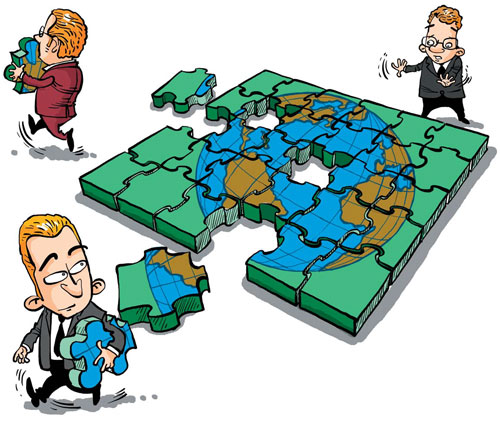|
 |
Globalization is still an emotive word, but the phenomenon has been going on for centuries. What have the Romans ever done for us? Well, they played their part.
China's Han Dynasty (206 BC-AD 220) was a crucial component of the same well-established trade network of 2,000 years ago, and now the country once again stands at the heart of the world economy.
But few nations know better than China that globalization can go backward as well as forward. Witness the 400 years of isolation before the sweeping economic reforms that have wrought such a dramatic transformation during the past three decades.
Now, quite suddenly, the threat of isolationism looms again. All over the world, bankers and investors have retreated to their domestic markets, driven back by the enervating effects of the global financial meltdown.
Two years ago, the Bank for International Settlements (BIS) released an alarming set of figures that revealed cross-border lending had plummeted by $4.8 trillion (3.37 trillion euros) in the nine months to December 2008. This was the most dramatic fall ever recorded.
Although its latest figures inevitably demonstrate a measure of recovery, the same institution recently warned that divergence between markets means there is greater uncertainty now than before what has become known as the Great Recession.
It was at around the same time that the record fall in cross-border lending was announced that China first floated the idea of a super-sovereign reserve currency to supplant the US dollar. As the once mighty wave of financial globalization receded, this represented a dramatic statement of intent from the world's emerging superpower.
To remind us this concept has by no means been forgotten, Xu Hong-cai, a deputy director at the China Center for International Economic Exchanges, recently produced a paper that called for an end to the dominance of the dollar in the interests of "stability and fairness". His call was publicized ahead of a G20 seminar at which China's own exchange rate was not up for discussion.
With confidence low and tensions high, it seems the only thing the credit crunch has helped to spread is fear. We find ourselves potentially teetering on the brink on an era of de-globalization - and that is a worrying prospect.
At this point it might be of benefit to reassure ourselves that the term "globalization", although it became widespread only in the latter part of the 20th century, is by no means a new occurrence.